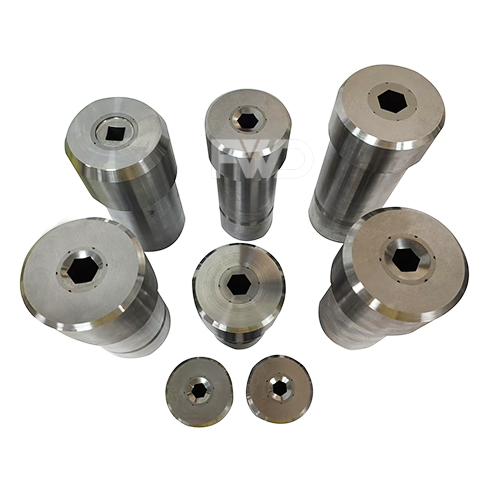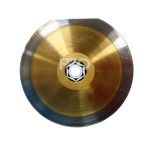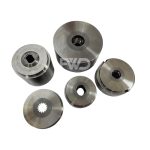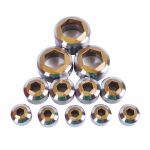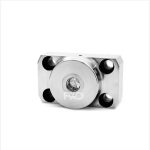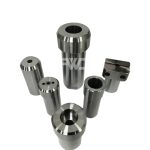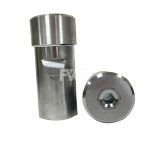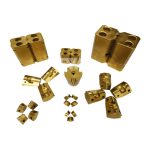Tungsten Steel Molds
Tungsten carbide molds are commonly utilized in cold heading, hot forging, and stamping processes, making them an ideal choice for manufacturing industrial fasteners with tight tolerances and high-performance requirements.
1. Exceptional Hardness and Wear Resistance
Tungsten steel, particularly tungsten carbide, is known for its Rockwell hardness exceeding HRC 90, making it significantly more wear-resistant than traditional tool steels. This property ensures prolonged mold life, reducing the frequency of mold replacement and minimizing downtime in production.
2. High Precision and Consistency
With advanced CNC machining and EDM (Electrical Discharge Machining) processing, tungsten steel molds offer micron-level precision, ensuring that fasteners meet exact specifications. The superior dimensional stability of tungsten steel eliminates variations and enhances product consistency.
3. Superior Thermal and Corrosion Resistance
Unlike conventional steel molds, tungsten steel molds withstand extreme temperatures and resist oxidation and chemical corrosion. This property makes them ideal for high-temperature forging processes, extending mold lifespan and ensuring production efficiency.
4. Enhanced Production Efficiency
Tungsten steel molds are designed to withstand high-speed stamping and forming operations without deformation. This capability improves production speed, reduces downtime, and optimizes overall manufacturing efficiency.
5. Cost-Effective Long-Term Investment
Although the initial cost of a tungsten steel mold is higher than traditional steel molds, its durability and wear resistance significantly reduce long-term operational costs. Manufacturers benefit from lower maintenance expenses and fewer mold replacements over time.
Cold Heading Molds: Used for precision forming of bolts, screws, and rivets without heating the material, ensuring high-strength fasteners with smooth surface finishes.
Hot Forging Molds: Ideal for producing high-strength fasteners that require exceptional impact resistance and load-bearing capacity.
Thread Rolling Dies: Essential for creating threaded fasteners with high precision and superior durability.
Stamping Dies: Used in sheet metal forming processes for manufacturing washers, clips, and other fastener-related components.
Wire Drawing Dies: Applied in wire shaping and size reduction for producing consistent fastener materials.
FAQ of Tungsten Steel Molds
Why Choose Our Tungsten Steel Molds?
Our company specializes in manufacturing high-performance tungsten steel molds tailored to the fastener industry’s demanding requirements. We use premium-grade tungsten carbide materials, cutting-edge machining technology, and stringent quality control measures to deliver superior mold solutions.
Key Features of Our Tungsten Steel Molds:
Manufactured with ultra-fine tungsten carbide powder for enhanced toughness and longevity.
Precision machining with 5-axis CNC technology to ensure exact dimensional tolerances.
Customizable designs to meet specific fastener production needs.
Polished and coated surfaces for reduced friction and extended mold life.
Comprehensive quality control for guaranteed performance and durability.
Customization & Technical Support
We understand that every fastener manufacturer has unique requirements. That’s why we offer custom tungsten steel mold solutions, ensuring compatibility with different production lines and fastener specifications. Our team of engineers and mold specialists provides technical consultation, helping clients optimize their manufacturing processes with the right mold design and material selection.
Order Your Tungsten Steel Mold Today
Upgrade your fastener production with our high-precision tungsten steel molds. Contact us today to discuss your mold requirements, request a custom quote, or get expert advice on selecting the best mold for your application.
Order Process

